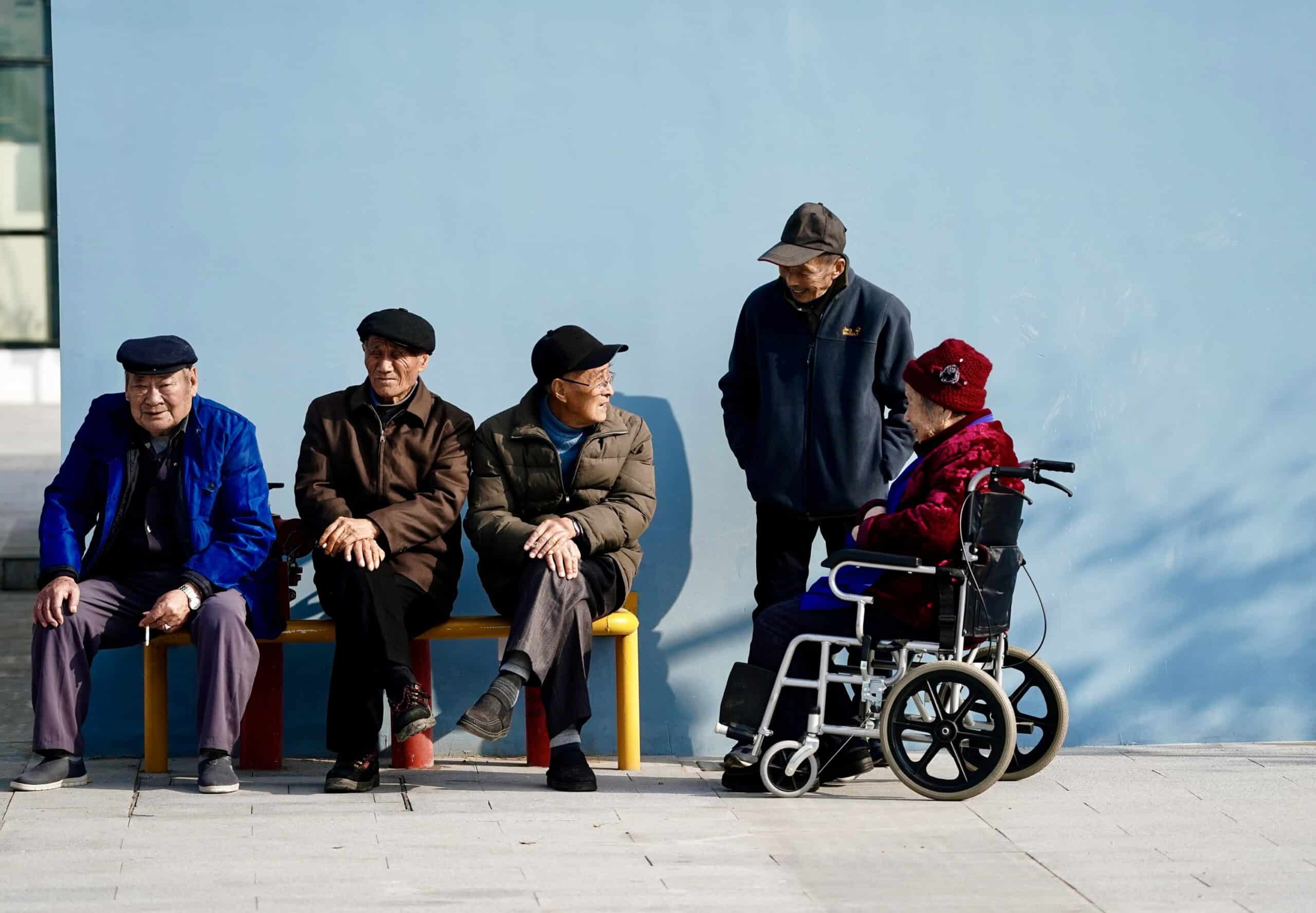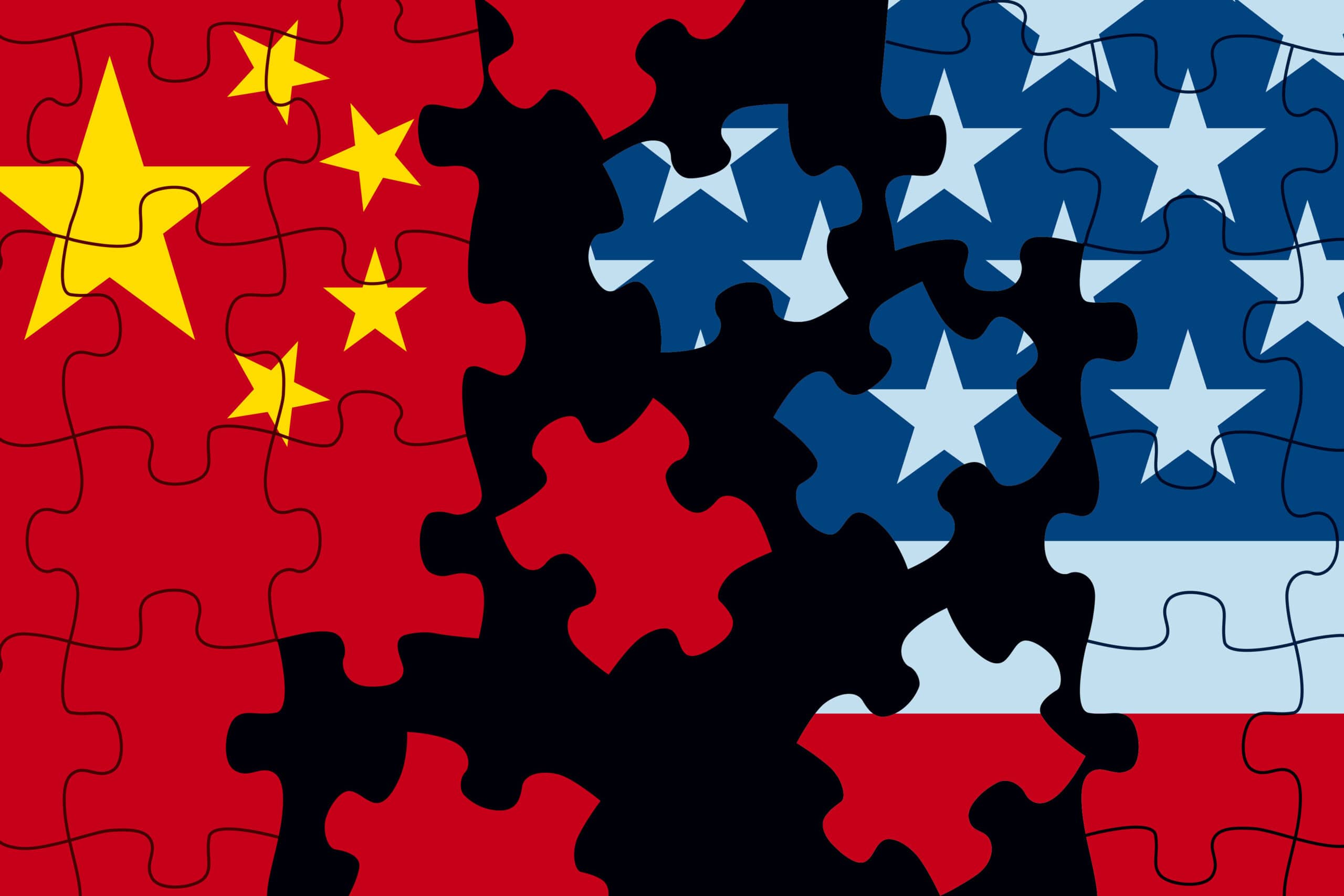
Twenty-five years ago, Charlene Barshefsky, the tough-as-nails U.S. Trade Representative, negotiated China’s entry into the World Trade Organization. The deal was bound to be a winner for America, Barshefsky and the rest of the Clinton administration believed, because it tied China more closely to the U.S. and the West.

“The fundamental goal of WTO entry, from the point of view of the U.S., was to move China’s own internal reform process toward market-based economics,” she told The Wire China in 2022, in the first of two dozen interviews for the new Rules of Engagement series. “We saw a pattern in China’s economic behavior and a trajectory on which we wanted to capitalize. “
To Matt Pottinger, the Trump administration’s deputy National Security Advisor, America should quickly have realized that engagement was folly.
“I thought that we were behaving as though we were blind and deaf to the reality of the Chinese Communist Party’s ambitions, its hostility to the end-state that we were trying to achieve, and its resourcefulness in working to achieve its ambitions globally,” he said in a second Rules of Engagement interview a month later.

Launching the series, I had hoped the hour-long interviews I planned to conduct with top U.S. officials during the past six presidential administrations would help readers (and me) understand how the U.S. plotted China policy, the shift over the years from a warm embrace between the two nations to a frigid standoff, and the thinking and motivation of American decision-makers. I was looking for a way to understand the arc of U.S.-China relations.
I had reported on the American response to China since the 1990s for the Wall Street Journal and wanted to get better insight into the history I had covered and the people who made it. As a reporter, I sought to draw out the interviewees and get them to explain their thinking and not to try to convince them of my views. I suppose I had long been caught up with the possibilities of engagement, as China exploded on to the global scene. In the years I was based in China, 2011 to 2014, the notion of “Chimerica” — a deep embrace between the two nations helping to create a better world — still seemed possible, though the prospects were quickly fading.
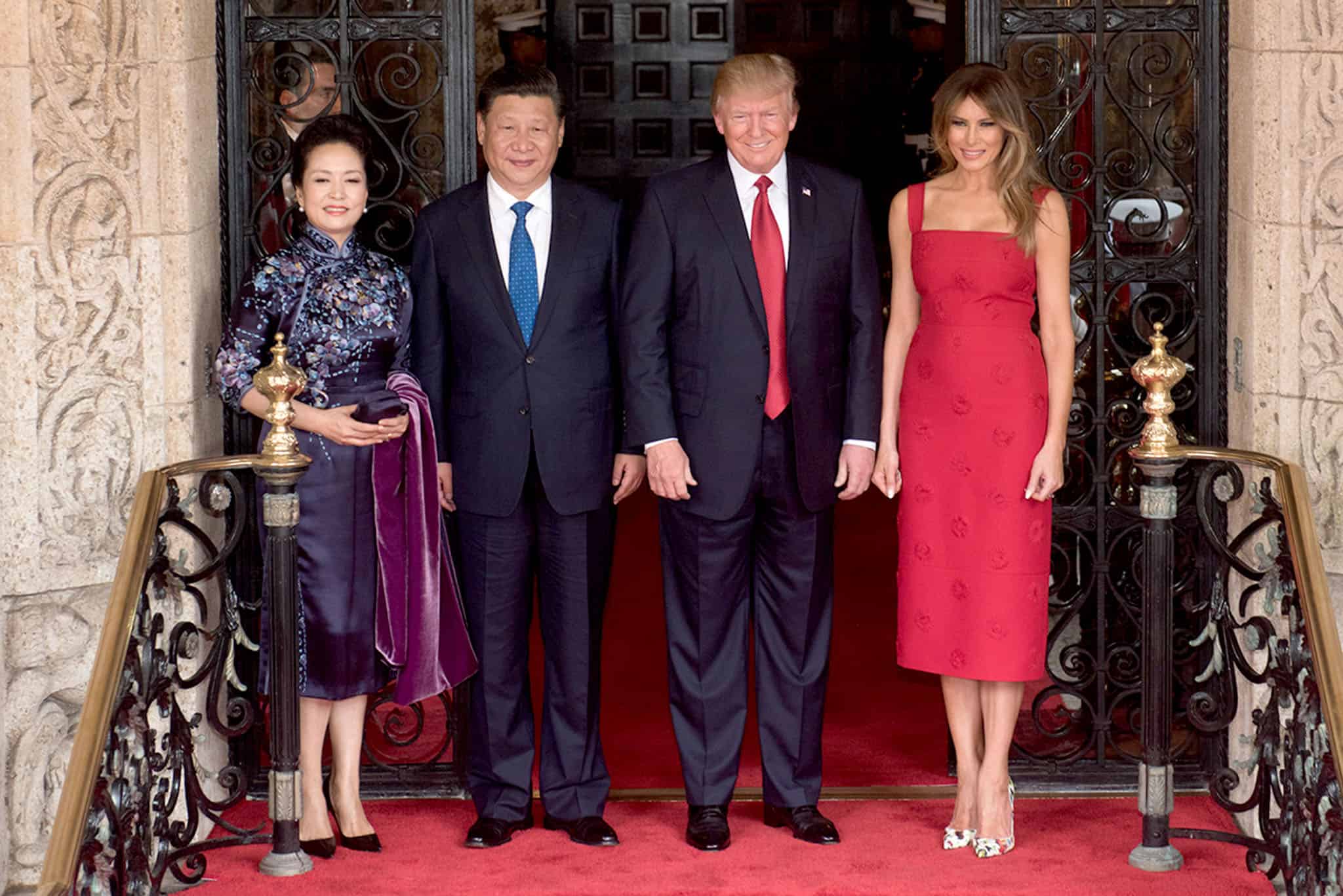
The interviews became a kind of extended conversation between generations of government China hands. Looking over the interviews, often the sharpest disagreements weren’t between Republicans and Democrats, as I had expected. Rather, the dividing line was around 2016, after Xi Jinping entrenched his power as China’s leader and Donald Trump won the presidency. Post 2016, Washington officials, whatever their political affiliation, invariably were more disillusioned with China than their pre-Xi/Trump predecessors.
Over the past two years, I have interviewed a Speaker of the House (Nancy Pelosi), two Defense secretaries (Robert Gates and Ash Carter), one Secretary of State (Mike Pompeo), two Treasury secretaries (Larry Summers and Robert Rubin), two National Security Advisors (Steven Hadley and Robert O’Brien), a National Security Agency director (Mike Rogers), three U.S. Trade Representatives (Barshefsky, Robert Zoellick and Michael Froman), three ambassadors (Nick Burns, Gary Locke and Rahm Emanuel), and an assortment of deputy cabinet officers and other government officials deeply involved in China policy (Pottinger and Kurt Campbell, among others).
Their answers were revelatory, not just of their policies, but of themselves, including some quirkiness at odds with their public persona. I wouldn’t have guessed that the favorite movie of cerebral Larry Summers, an ex-Harvard president and Treasury secretary, was “Rocky” (His aides swear there is a video somewhere of Summers in a gray sweatshirt sprinting up the front steps of a building, Rocky-style. They won’t hand it over.)
Another surprise was that buttoned-down Robert Rubin, who ran Goldman Sachs before becoming Treasury secretary, named Johnny Cash’s “Folsom Prison Blues” as his favorite song. (One of Rubin’s aides scoffed at Rubin-as-country-music-aficionado. “I do remember he once asked whether Jimmy Buffett was related to Warren,” the aide emailed.)
And maybe it wasn’t a surprise, but it was still fascinating when Defense Secretary Ash Carter, a PhD theoretical physicist, said “my favorite reading is science textbooks.” Tough to lug on a beach.
The interviews gave me the opportunity to ask Matt Pottinger if his father, a former Justice Department attorney, had told him he knew the identity of Watergate’s Deep Throat many years before it was revealed to be Mark Felt, the former Federal Bureau of Investigation deputy director.
We have to stop kidding ourselves that we can turn a great white shark into a bottlenose dolphin by treating it sweetly. It’s not going to behave like a bottlenose dolphin. It is a shark. Therefore, you have to constrain the shark’s activity.
Matt Pottinger, the Trump administration’s deputy National Security Advisor
His dad was tight-lipped, said Pottinger, a former journalist. “Didn’t it drive you crazy” not to know, I asked. Not at all. “I’m someone who’s been both a journalist and someone who’s been a keeper of secrets as a national security practitioner,” Pottinger said.
And it was also intriguing to probe Rahm Emanuel, Biden’s ambassador to Japan, about why he trolls Xi Jinping on X, the former Twitter. “Maybe it’s just that I don’t really like to be deceived and played for a fool,” by a lying Chinese leadership, he said.
EARLY DAYS

The central recurring theme of the interviews, however, was engagement with China. How had the policy evolved? How had it turned sour? Did it have a future?
President Nixon’s 1972 flight to China, heralding the start of the engagement era, occurred 50 years before my first interview, so many of the earliest policy makers had passed from the scene. (Henry Kissinger, the co-architect of Nixon’s opening to China, declined an interview before he died at age 100 in 2023.)
Some of the interviewees had been involved in China policy since the bloody crackdown in Tiananmen Square in 1989, and that’s where my questioning began. Although engagement is usually understood as economic outreach to China, it began as a geopolitical strategy to work with China against the Soviet Union. Business and trade were an afterthought.
At the start, American officials were almost giddy at their reception in China. Robert Gates, who would become director of the Central Intelligence Agency and Secretary of Defense in two administrations, was a young CIA official when he toured Beijing in 1980. “My general reaction was one of incredulity,” he told me. “The notion of two or three CIA people wandering openly in and around Tiananmen Square at that time seemed a little jolting, to tell you the truth.”
Then President George H.W. Bush speaks to press about the crackdown on protests in Tiananmen Square and the U.S.’s subsequent suspension of arms sales to China, June 5, 1989. Credit: USC
During another trip, he stopped at a radar station monitoring Soviet missile launches. “It was bizarre to go to a PLA [People’s Liberation Army] facility and see young PLA officers being trained by Americans on how to read telemetry, which was top secret back in the United States.”
Relations soured after the Chinese government massacred protestors in Tiananmen Square in June 1989 and President George H.W. Bush suspended military sales and high-level contacts. But the latter lasted just a few months. I asked about that too.
Robert Zoellick, then a State Department official, said his “heart sort of sank” when he saw newspaper photos of then-National Security Advisor Brent Scowcroft toasting his Chinese hosts in Beijing on a supposedly secret mission in December 1989, which was widely criticized as toadying up to murderers. But the foreign policy realist in Zoellick recognized the importance of a rapprochement. After the U.S. and China patched up relations, Beijing ended its nuclear and missile proliferation, he said, and didn’t block U.S. efforts to win United Nations Security Council support for the Gulf War to expel Saddam Hussein from Kuwait in 1991.
“From a strategic point of view, one could see the rationality,” Zoellick said.
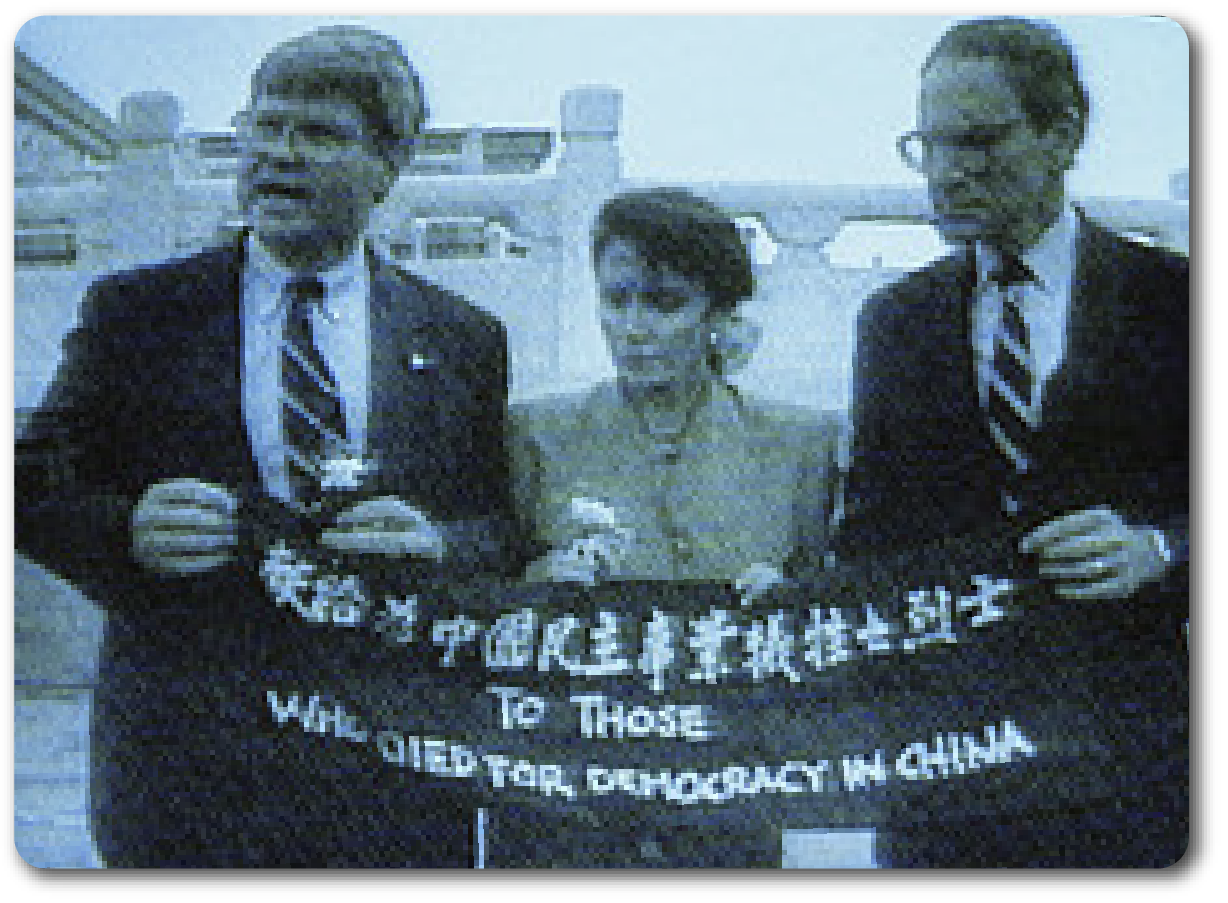
Perhaps he could, but Nancy Pelosi, then a young California House member, was appalled at the Tiananmen Square killings and Bush’s response. She led annual fights to strip China of its preferential trade status, which earned her national attention and made China a career priority. “Now you have to remember, I’m a complete nobody and all of a sudden, I’m challenging the president of the United States,” Pelosi recalled with some wonderment. (She said she “loved” Bush and the hand-written notes he would send, but “we had our differences.”)
THE WTO DEBATE
Trade and economics became more of a focus under Bill Clinton, whose campaign had attacked “the butchers of Beijing,” but whose administration wound up backing China’s entry into the WTO. Clinton’s successor, George W. Bush also focused on the economy and relied on Chinese help in 2008 to combat the global financial crisis.

In her interview, Barshefsky recalled some of the tenser scenes during the WTO negotiations. As talks were cratering, she decided to publicize China’s proposed trade concessions even though the two sides were far from a deal. Chinese negotiators were apoplectic.
There was “only one reason: To hold China to it,” she said. “I was afraid there would be enormous pressure on the Chinese side to pull back on what they had agreed to do,” she said.
“They weren’t happy, but you know, they have a very long history,” she said. “They seem to always recover.” (Another time, Barshefsky told me that she never ate any part of an animal at Chinese banquets that she didn’t recognize. She figured the Chinese would get over that too.)
For his part, Zoellick explained his oft-cited call in 2005 when he was Deputy Secretary of State for China to become a “responsible stakeholder” in international affairs, a term that is now sometimes used mockingly.
Robert Zoellick speaks during a House International Relations Committee hearing on the topic “A Resurgent China: Responsible Stakeholder or Robust Rival?”, May 10, 2006. Credit: C-SPAN
“I didn’t say China was a responsible stakeholder,” Zoellick said. “I was urging it to be one. I was a diplomat and this was a diplomatic strategy. I find it odd that people would complain about an idea that says to the Chinese, ‘Look, we want you to bear more responsibilities, and we, the U.S., will be the judge.’”
Pottinger, the Trump national security official, said he once too had hoped engagement would lead to a more liberal, welcoming China. But, he reasons, that hasn’t happened, so the U.S. needs to be much more confrontational.
“We have to stop kidding ourselves that we can turn a great white shark into a bottlenose dolphin by treating it sweetly,” Pottinger said. “It’s not going to behave like a bottlenose dolphin. It is a shark. Therefore, you have to constrain the shark’s activity.”
Should the U.S. engage China or try to isolate it? That’s a debate that echoes through the Rules of Engagement interviews and in China circles more broadly.

Summers, who was Treasury secretary during the Clinton administration, says isolating China by blackballing it from the WTO would have been disastrous.
“We would have extracted no commitments from them, would have had no multilateral mechanism for continued engagement, and we would have projected an active desire to hold them down,” he said. “That would have been an extremely serious error, which would have led to less favorable American economic interests and a more vexed security relationship over the last 20 years.”
The Biden team says that it is trying to split the difference between engagement and isolation by working with China in areas like climate and health, while limiting cooperation in advanced technology. But relations remain fraught. “In some respects, it harkens back to an earlier era in China, where ideology and the [Party] line were of paramount importance,” said Kurt Campbell, who was the Biden National Security Council’s Asia chief when I interviewed him.
He recalled a recent meeting with a Chinese diplomat he considers a close friend. “We were out on a stroll,” said Campbell, who is now Deputy Secretary of State. “I asked him some questions and he stopped me and said, ‘You know, Kurt, I can talk about children. I can talk about grandchildren. We can talk about sports. But some of the discussions that we had before, we can’t have those again.’”
A PROSPEROUS CHINA?
The division over engagement — with 2016 as the dividing line — shows itself most clearly in the answer to a question I posed in most interviews: Is a prosperous China in America’s interest?

Starting with the George H.W. Bush administration about 35 years ago, the U.S. government always answered with a resounding yes. Given the economic links, a richer China seemed to mean a richer America. “The United States welcomes the rise of a stable, peaceful, and prosperous China,” the 2015 Obama national security strategy stated, using a formulation similar to prior administrations.
Gates was Defense Secretary under George W. Bush and Obama when ‘yes’ to Chinese prosperity was official U.S. policy. Now with Xi in power, he says, no way.
“A prosperous China with Xi Jinping in charge is not in our interest,” Gates said. “An authoritarian government in Beijing that intends to displace the United States as the preeminent power in the world, and the preeminent influence economically, politically and even militarily — that kind of a government is not in our interest.”

Robert O’Brien, Trump’s National Security Advisor, was even more emphatic. “I’m not hoping for a prosperous China right now because they’re using that prosperity to build tanks and aircraft and fighter jets to kill young American men and women,” he said.
XI MISUNDERSTOOD
Many of the interviewees tried to puzzle out how they had misread Xi Jinping and pegged him as a Deng-style reformer. Gary Locke, Obama’s ambassador to China, had spent time in 2012 with then Vice President Xi when he visited the U.S. and met with him after he became Party chairman.
I’m in adamant disagreement with some of the people now in the Biden administration who, for political reasons, have come up with the argument that engagement has failed. It’s not that everything is hunky dory with China. Diplomacy is an ongoing activity.
Robert Zoellick, former U.S. Trade Representative, diplomat and World Bank president
“I remember that when he was vice president, he talked about some of the lessons of his father [revolutionary leader Xi Zhongxun],” Locke said. “In one story he recounted, there were some upheavals and authorities in China were cracking down in a violent way on people who were trying to leave the country or who were protesting social conditions in China. He said that his father said that the government needs to look at their underlying dissatisfaction and not just react to their protestations. So, I think there was hope that he would be a little bit more of a humane leader.”

Zoellick, who met with Xi as a State Department official and later when he was head of the World Bank, said Xi had “a more affable exterior” than Russian leader Vladmir Putin, but revealed little of himself personally. “One has to recognize that if you lived in a cave for ten years during the Cultural Revolution, and then climbed up the greasy pole and are now at the top of the Chinese power system, you’re not going to give too much away,” said Zoellick, who took an almost journalistic interest in the leaders he met.
But Zoellick said Xi did hint that ideology was crucial to his thinking. During a small meeting with World Bank officials, he asked Xi, then vice president, about his development priorities.
“His answer was very telling,” Zoellick recalled. “He started by saying, ‘The 86.68 million members of the Communist Party…’” That’s an answer Zoellick said he never heard from other global leaders and “was a rather strong indicator [of the direction Xi would take.]”

Although U.S. leaders were unprepared for Xi’s aggressive turn, several interviewees thought Xi had made a serious error by rejecting Deng Xiaoping’s famous directive for China to “hide your strength and bide your time” in international affairs.
“He provoked the United States; he scared the United States,” Gates said. “He provoked an economic reaction from the United States and a military buildup.”
Still, most also said the U.S. had been much too slow to react to Xi’s aggressive moves. President Obama and his administration came in for sharp criticism, even by some of its members.
In a White House Rose Garden appearance with Obama, Xi promised an end to cyber theft of corporate secrets and business information. Michael Rogers was then director of the National Security Agency, which tracked Chinese cyber spying. “We did see some measure of significant downward levels of activity for about six months,” Rogers said. “Then we watched them ramp it back up again” although the Chinese made more efforts to hide their tracks.
Only six months? Why didn’t Obama order retaliation, I asked, or did he?
“My sense of President Obama’s view was, ‘Look, we were able to achieve some level of enhanced behavior once. Let’s keep working to see if we can do it using the same methodology,’” Rogers said. Obama “was not a big fan of being publicly confrontational,” he said.

Similarly, as China started turning spits of land in the South China Sea into military bases, the U.S. didn’t block the activity. Although the Obama administration announced a “pivot” to Asia in late 2011, Obama’s Defense secretary Ash Carter said the policy was stillborn. The Pentagon shifted resources, he said, but couldn’t count on the State Department for support.
“There were American leaders who went out and said, ‘Oh, who’s going to start a war over little islands in the South China Sea?’’ Carter said. “That’s a self-defeating statement.”
Carter didn’t name names and died shortly after the interview ran in October 2022. But he appeared to be referring to then Secretary of State John Kerry, who was trying to defuse tension over Chinese island building. “We support diplomacy in an effort to try to resolve this with an understanding that there really is no, quote, ‘military solution,’” Kerry had said in New Delhi in October 2016.
Carter said he didn’t want the U.S. Navy to try to block the Chinese, which could have led to war. He wanted financial and other sanctions. “The way we get the Chinese not to do something we don’t want them to do is to have a broader political, economic, and military relationship that makes them realize that they’re going to pay a price for doing things that are self-isolating,” he said.
HUMAN RIGHTS AND WRONGS
Another frustration in dealing with China — no matter which administration — was Beijing’s unwillingness to ease internal repression. The Clinton administration tried to force progress on human rights by threatening to withhold trading privileges. That flopped: “The Chinese basically told [Secretary of State Warren] Christopher to go pound sand,” said Gates. “And the Clinton administration essentially abandoned that aspiration and turned to the economic relationship.”
The George H.W. Bush administration quickly gave China a pass after the Tiananmen Square crackdown. The George W. Bush and Obama administrations also didn’t have much luck in pressuring China because they needed Beijing’s help on the economy, climate change, and fighting terrorism.

Human rights wasn’t much of a winner politically at home either. Locke, the Obama ambassador to China, recalls providing blind dissident, Chen Guangcheng, refuge in the U.S. embassy and helping him move to the U.S., only to see him become a speaker at the 2020 Republican presidential convention. “I think he had been captivated by other groups,” Locke said. “ I’ll just leave it at that.”
The Trump and Biden administrations have gone a step further and designated China’s repression of Uyghurs as genocide, though that hasn’t seemed to convince China to ease their pressure on Xinjiang. Pelosi, the former House Speaker, says she isn’t surprised successive White Houses haven’t made much progress. Big business lobbyists were always able to defeat her push to strip trading rights from China, which she figured could have finally convinced Beijing to change its ways. (A succession of administration officials disagreed with her.)

“As to whether we have improved the situation, “ Pelosi said. “No, because money won.” Still, she says the fight is worth it. “We persist,” she said. “The worst thing is for Chinese repressors to tell a prisoner that, ‘Nobody even knows about you anymore. They’ve forgotten all about you.’”
THE TAIWAN TEST
Perhaps the area of greatest agreement among the interviewees concerned Taiwan. Nearly all thought successive Taiwanese governments haven’t done enough to defend the island. Taipei spends heavily on tanks and jets that would be overwhelmed by a Chinese offensive, several officials said, and neglects the drones, electronic warfare, anti-missile defense, and mines that might make the Chinese think twice before invading.

“They need to make themselves a very tough nut to crack,” said Carter, the former Defense Secretary. “That means making it suicidal to attempt an amphibious or airborne invasion of Taiwan. And secondly, make it as painful for China as it would be for Taiwan if they try to strangle Taiwan” by the U.S. blockading Chinese oil imports.

Most thought the chances of a Chinese invasion or blockade were rising, though Stephen Hadley, President George W. Bush’s National Security Advisor, made an intriguing counterpoint. He discussed a Bush administration memo saying that then-Chinese leader Jiang Zemin had set a 2008 deadline for China to be prepared to take military action on Taiwan. These days, the Biden administration talks about a similar order by Xi Jinping, with the possible invasion year now 2027.
Perhaps Chinese leaders routinely give such orders as a precaution when they fear Taiwan might declare independence, and the U.S. misinterprets the intelligence as an action order. Hadley wasn’t sure. “The intelligence was that Jiang Zemin had given that direction to his military,” Hadley said. ”What the military told him when that date came by, I don’t know.”
Campbell, the Biden Deputy Secretary of State, and O’Brien, the Trump National Security Advisor — top officials in administrations that rarely agree on anything — had the same response to the possibility of misinterpretation: That was then; this is now. Xi sees reuniting with Taiwan as part of his legacy and the U.S. should take him at his word.
A clip from Xi Jinping’s 2024 New Year Address, during which he mentions China’s reunification with Taiwan, December 31, 2023. Credit: CCTV
“We believe that President Xi has exhibited a degree of impatience and ambition with respect to Taiwan that concerns us,” said Campbell.
O’Brien answered the question by trying to put himself in Xi’s shoes. China is struggling to keep up with Taiwan’s semiconductor technology and faces a shrinking population. Grabbing the island could help on both counts. “Looking at it from Xi Jinping’s perspective,” O’Brien said, “he’s thinking, ‘I can intervene in history, I can block some of the trends that are negative for China.’”
DEBATING DECOUPLING
So where does that leave U.S.-China relations? Interviewees disagreed whether the U.S. should make a priority of reengagement or disengage further. Again, 2016, was the dividing line. Zoellick, the Bush State Department official and U.S. Trade Representative, said the U.S. should look for noncontroversial ways to draw China and the U.S. closer again, perhaps by regularly discussing global economic problems at the International Monetary Fund.
“I’m in adamant disagreement with some of the people now in the Biden administration who, for political reasons, have come up with the argument that engagement has failed,” he said. “It’s not that everything is hunky dory with China. Diplomacy is an ongoing activity. Now and then you’ll have differences that you have to manage.”
I believe that we’ve entered a new period where results have more to do with clear lines of communication and laying out specific areas of anxiety and concern on both sides. Just the act and the fact of greater clarity and understanding is an important signal.
Kurt Campbell, former Biden administration Asia chief and current United States Deputy Secretary of State
Biden and Trump officials disagree on the degree of decoupling that makes sense. But they are in lockstep about the need to cut off China from advanced technology. That effort started at the end of the Obama administration when the U.S. blocked Chinese firms from buying American semiconductor makers. But it gained momentum under Trump as Pottinger and Pompeo crisscrossed the world to convince countries to reject low-price Huawei telecommunications equipment, raising the specter it could be used to spy on buyers. They scored a big victory when Britain changed its mind about going with Huawei.
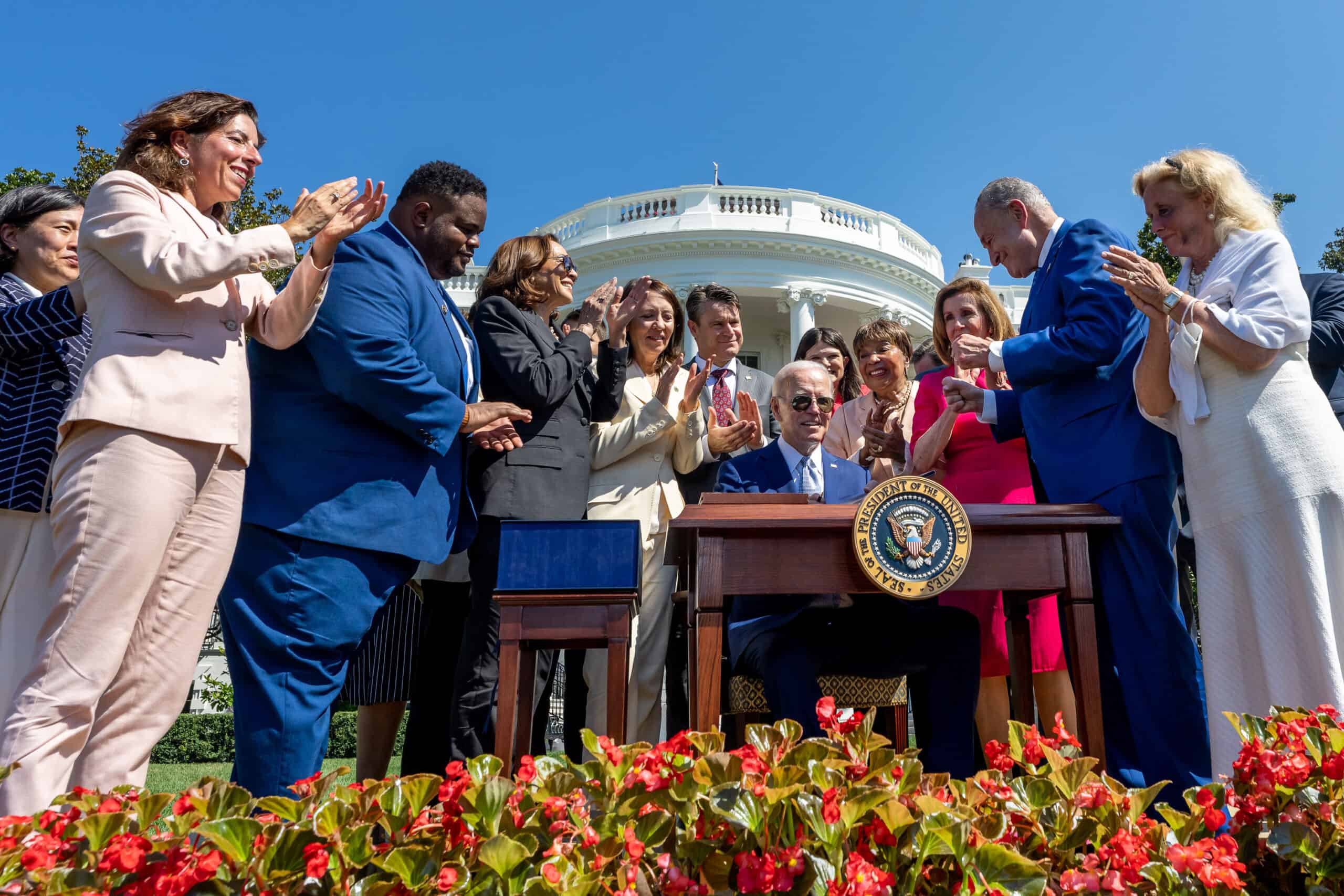
Under Biden, the U.S. has sought to strangle China’s ability to make the most advanced computer chips used in artificial intelligence. “It doesn’t appear that China will have any realistic route in the next several years to cost-effectively produce chips that are more advanced,” said Jason Matheny, a top Biden NSC technologist who is now CEO of the Rand Corp. think tank. “All of that makes computing more costly, which then makes it more costly to make large-scale AI systems.”
How extensively to decouple — the Biden team prefers the term derisk — is a matter of big debate. Pompeo, Trump’s Secretary of State, would formally recognize Taiwan, a move bound to rupture relations with Beijing. “We’ve made the mistake of being too timid in acknowledging the reality” that Taiwan operates as a sovereign nation, he said.
But Jay Shambaugh, Biden’s Treasury undersecretary for international affairs, said that the two nations must at least be able to work together to ease global financial crises, as they did in 2008 and 2009. That requires regular talks, at the very least, which the Biden team have been trying to arrange.

“I believe that we’ve entered a new period where results have more to do with clear lines of communication and laying out specific areas of anxiety and concern on both sides,” said Campbell, the Biden Deputy Secretary of State. “Just the act and the fact of greater clarity and understanding is an important signal.”
U.S. business also must tamp down its expectations about the China market, said Myron Brilliant, who once organized enormous business coalitions to go to bat for China as executive vice president of the U.S. Chamber of Commerce.
“For companies looking to get into the Chinese market, it depends on where you are,” Brilliant said. “If you’re in a high technology sector, the risks are so high that the rewards are probably not worth it. If you’re in a commodities business, you may still see significant opportunities.”
NEXT MOVES

With relations looking grim, several interviewees made suggestions about how to move forward. The former trade officials discussed the need for a trade deal to solidify U.S. relations with Asian nations and pressure China to change. Under the George W. Bush and Obama administrations, the U.S. negotiated the Trans-Pacific Partnership, which would have created a free-trade pact between the U.S. and 11 Asia-Pacific nations. Trump scrapped negotiations on his first working day in office.
How to revive it? Ditch the name because it’s toxic politically, but retain the concept of a trade bloc that could counterbalance China. Michael Froman, Obama’s U.S. Trade Representative, who spent years negotiating the TPP, suggested nations could instead join a U.S. trade pact with Mexico and Canada. That would expand the U.S.-Mexico-Canada Agreement, which passed Congress in the Trump administration by a wide margin, to include Asian nations, Britain and others.

Emanuel, the U.S. ambassador to Japan and a former White House chief-of-staff known for his political smarts, tried out the pitch for a possible trade arrangement. “I don’t think we should put the entire burden of America in the Indo-Pacific on the young men and women that I’ve met on the USS Ronald Reagan,” he said. Economic burden-sharing is necessary too — that is some kind of trade arrangement.
“How do you figure out an economic component, given the domestic politics, with a security component?” Emanuel continued. “That’s what you do with statecraft. There are domestic pressures in the country. You try to figure out the right politics to see your interests through. It’s not that hard.”
Perhaps, though it’s hard to imagine a second Trump administration reviving anything that looks like TPP. The Trump aides I interviewed had a different initiative in mind. This one would split Russia from its “no limits” partnership with China and move it closer to the United States. O’Brien called it “a kind of reverse of what Kissinger did with China.”

In the Rules of Engagement interview, he said he and Pottinger had already made the first moves when they met Russian officials in Moscow during the Trump years. Russia had seized thousands of square miles of Chinese territory during the 19th century, they reminded their Russian hosts. Did they really think Xi would rest before he recovered that territory?
Of course, Russia’s reliance on China in the Ukraine war makes peeling off Moscow unrealistic now. But if the war ends, said O’Brien, “you could try and figure out how to explain to the Russians that it’s not in their best interest to be so cozy with a country that believes Russia has got tens of millions of acres of their territory.”

For myself, the interviews convinced me that the era of engagement was dying if not dead. Pottinger said engagement died in 2020. I would sound the death knell on March 16, 2020. That’s when President Trump started labeling the Covid-19 “the China virus.” If the world’s two largest economies couldn’t even agree to cooperate on eradicating the most deadly pandemic in a century, “Chimerica” had clearly been a chimera.
But I can’t say that I wound up as hawkish as Pottinger and others. I still don’t see China as a shark to be caged. And while engagement is clearly in retreat, it’s not dead. An ambition never really dies.
I kept thinking back to the Cold War. To me, it wasn’t just the Reagan arms buildup or the equipping of the Mujahideen in Afghanistan to make the Soviet occupation more costly that fractured the Soviet Union. It was also detente — another word for engagement — that did the Soviets in. With detente, Soviet and Eastern-bloc citizens got a clearer view of American and Western freedoms and prosperity.
So, the proper course, I think, is to engage where possible while rebuffing where necessary. That puts the focus on America as much as on China when it comes to U.S.-China relations. The goal should be to make the U.S. the kind of society and economy that Chinese would want to emulate. Can we honestly say that’s the sort of society we have now?
Rules of Engagement has sought to air ideas of this sort, whether it’s a Pogo-like notion that “we have met the enemy and he is us,” or a new-age TPP or a U.S.-aligned Russia against China, or one of another thousand ideas. How the U.S.-China relationship will evolve is one of the most important geopolitical questions of this century.

Bob Davis, a former correspondent at The Wall Street Journal, covered U.S.-China relations beginning in the 1990s. He co-authored “Superpower Showdown,” with Lingling Wei, which chronicles the two nations’ economic and trade rivalry. He can be reached via bobdavisreports.com.


